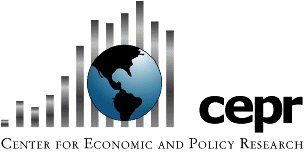FOR IMMEDIATE RELEASE
CONTACT: Dean Baker
CEPR Proposes Speculation Tax Washington, D.C. -- The Tax Foundation, a conservative think tank, has dubbed May 3rd as "Tax Freedom Day." It has chosen this date by calculating the percentage of national income that goes to taxes of all types (state, federal, and local). It then determines the date when the same percentage of the year has passed. As several recent studies have shown, this method significantly overstates the tax burden for a typical family. Because the nation has a progressive tax structure, with wealthy households paying a larger portion of their income in taxes, the typical family actually faces a considerably lower tax rate than what the Tax Foundation estimates. A typical family in the middle of the income distribution pays approximately 28 percent of its income in taxes, which would place its "Tax Freedom Day" at approximately April 12th. One way to make the tax system more progressive, and further move up a typical family's Tax Freedom Day, is to institute a tax on financial speculation such as the buying and selling of shares of stock, options, futures, and other financial instruments. Dean Baker, the co-Director of the Center for Economic and Policy Research, calculated that a modest tax of 0.25 percent on the sale or purchase of a share of stock, along with comparable taxes on other financial instruments, could raise more than $100 billion a year in revenue. This revenue could finance an income tax cut of 40 percent for a typical working family. A cut in the income tax of this magnitude would move up "Tax Freedom Day" for a typical family to the beginning of April, or possibly the end of March. Alternatively, the revenue from the tax could be used to fund important needs, such as national health care insurance, or the expansion of Head Start and Child Care. A proposed schedule for this tax, along with the revenue estimates, are included in his paper "Taxing Financial Speculation: Shifting the Tax Burden From Wages to Wagers." The paper also notes evidence from earlier studies that a small tax on financial transactions could play a stabilizing role in financial markets by reducing the volume of short-term speculation. This tax could have prevented some of the panic selling that has led to currency crises in East Asia, Russia, and Brazil in recent years. It could also slow the short-term trading which has led to large swings in the Nasdaq in recent months. In addition, by lessening the volume of trading, a speculation tax would reduce the amount of resources wasted in the operation of financial markets. These findings appear in the full paper, available online, or by calling (202) 293-5380. ### |
